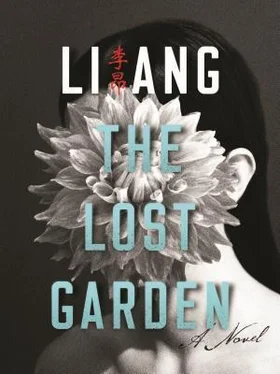Back then Father had yet to develop his own film, and Lucheng had no photo studio with equipment good enough for him, so the negatives had to be sent to nearby Taichung, the largest city in central Taiwan. It took many days before they could be picked up.
All she could see on these enlarged black-and-white photographs was dust, grayish dust that seemed to show up everywhere.
She never could forget the dust. Fine grains of dusty sand traveled on the wind from the ocean near Lucheng the year long, roiling and flying around the small hill by Lotus Tower, like shifting sand, and turning into flying pebbles by the time they made their way to Lotus Garden. Winter was the worst, for it was the season of howling north winds, and the lack of rain turned the place dry and cold. Wind and dust were so strong and pervasive that you had to squint when stepping outside. You could never keep up with the dust that gathered on furniture and household items, and the garden seemed buried in layers of it.
It was through a veil of floating dust under fluctuating sunlight that she saw Father’s lusterless face, gaunt after his long illness, looking as if gilded in a patina of gold, gloomy and melancholic.
The entire garden seemed buried in dust. When she came home from school, she was virtually alone, since her mother was busy caring for her father. She liked to wander over to Lotus Garden, with its tightly shut doors and windows, where she would pick out, among all the dust-covered spots, one blocked by less carved wood — usually a large pane of glass on the latticed window — reach out with a slender finger and slowly and carefully write her name. Her handwriting would make the pane look brighter, as if it had been wiped clean, revealing three large, unruly characters:
Zhu Ying Hong
Besides her own name, she liked to add Father’s name, leaving “Zhu Zu Yan” on the dusty window. Sometimes, having to stay clear of the carved wood on the window frame, she was forced to allocate the strokes different sizes, and the last three strokes in “Yan” would be oversized, straying out of the normal frame, looking out of proportion.
She came once each day, at least once every other day, to tend to her calligraphy, so that new dust would not settle on the places laboriously cleaned by her finger and return them to their original, dusty state. When she returned each time, she would trace her earlier handwriting to reclaim some of the clean space. But her finger did not always fall on the exact same spot and the characters would be elongated or puffed up, seemingly floating on dust, like an ever-growing corpse nurtured and nourished by it.
One day Mudan happened to stop by the garden for some used items. She mocked Yinghong when she spotted her busily writing on the windowpanes.
“You’d need a barrel maker to loop your characters together. Otherwise they’ll fall apart so easily you could never put them back together.”
Mother had been the first to poke fun at her handwriting, and when Mudan overheard that, she’d memorized every word and repeated it, even though, as an illiterate, she could not know what was being written.
Upset, Yinghong reached out and erased the characters, spreading columns of floating dust, all but blocking out the light as it lingered in the air. The names had not completely disappeared; parts of the characters were still visible on the cleaner windowpanes, but now they were just fragments, an eerie sight reminiscent of broken limbs. Dust returned slowly and swallowed up the remnants until they were no longer visible. Yinghong ran off in a panic, never to return to trace the names again.
It was during this time, when she was in the fourth grade, that her father recovered enough from his illness to take up photography. She saw the pictures of Lotus Garden when they came home from Taichung — small, black-and-white, glossy photos in which overcrowded houses and scenery seemed to overlap. The inadequate contrast of black and white presented a gray, dusty mess of light and shadows.
The light-gray areas resembled the soft traces her fingers had made on the windowpanes when writing names. The grayish white spots in the middle were places where more dust had accumulated on the messier parts of her handwriting.
In junior high school she continued to hold the view that her father had seen the same dusty Lotus Garden and had been able to freeze the sight into images and retain it as memory. She was an admirer of her father’s magic-like photographic skill.
Many years later when, with Lin Xigeng’s help, she was ready to renovate Lotus Garden, she dug up those photos as a record of the past and the basis for the renovation. Whenever she saw them, she could almost smell the stifling, humid air from the dust stirred up by her fingers as she wiped away the handwriting. It assailed her face, seemingly suffocating her, as if she had in fact breathed it in. For the longest time, she’d thought it was the smell of death.
Father was apparently dissatisfied with the results of his first photographic endeavor, for a few weeks later, Japanese books on photography began to show up in the house. Most of the printed examples were neat and well proportioned, but lacked strong contrast, owing to soft lighting effects, and the human figures looked stiff. Names like Akiyama Shotaro often accompanied the books.
When Father showed her his Leica III camera, he would not let her hold it, telling her that it was the first handheld camera in the town of Lucheng. At the time, photo studios and families owned only primitive first-generation cameras. “Press cameras,” he added in English.
“A press camera is not only heavy and clumsy but it lacks autofocus. So you have to judge the focus with your eyes or use a ruler.”
He continued happily, a rare event:
“Ayako, do you remember the wedding of Zhenyuan, Seventh Grand Uncle’s son, at the Upper House? The photographer measured each photo with a cloth ruler.”
Yinghong smiled and nodded.
“My Leica III has a twin lens reflex,” he said in English with a slight Japanese accent. “You can take a perfectly focused picture when the image overlaps the yellow frame in the lens.”
As he explained, he let her look through the lens to see for herself. She started out looking with both eyes, and naturally saw nothing at all. Then following Father’s instruction, she squeezed one eye shut and saw the yellow frame in the tiny glass frame. She tried for a long time yet failed to see how the images overlapped, despite Father’s repeated explanation, though she nodded and smiled, so as not to disappoint him.
In high spirits, he did not notice her reactions.
“It was a freezing winter when I bought this camera in Germany,” he explained. “Twenty or thirty degrees below zero. I took some pictures in the snow, and when I got inside, I noticed a thin layer of ice on the camera. I was worried that I’d ruined the fine machine.”
“What happened?” She was so eager to know the answer she forgot the family rule of never interrupting one’s elders.
“The camera was in perfect shape after the snow melted,” Father replied in a soft voice, a warm glint reflected in his slightly sunken eyes. His gaze fell on a distant spot, as he was immersed in reminiscence.
“Another time I took pictures of a waterfall and the lens got wet because I was too close. Water is the great enemy of cameras, so I was worried. Fortunately it was dry in Germany and the moisture disappeared in a few days.”
Touching the small, light camera, he continued slowly:
“There are many good things we get from advanced countries.” He paused and then said sadly, “I’d thought I could learn something from these advanced countries and find a use for them in Taiwan, but…”
Then he turned sardonic:
Читать дальше












